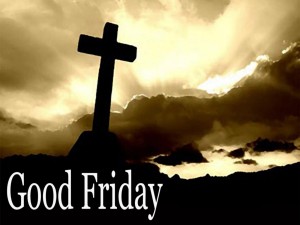Good Friday
The Lord be with you
The date for Good Friday is set by Easter and so moves from year to year. It falls between March 20 and April 23, inclusive. While our hymnals have consistently named this day “Good Friday,” there are other names used in other traditions. The three most common are: “Holy Friday,” “Great Friday,” and “Black Friday.”
 I have read that, in German-speaking countries, Good Friday is generally referred to as Karfreitag meaning “Mourning Friday” (Kar from Old High German kara, “bewail,” “grieve,” “mourn,” and Freitag for “Friday”). It is also called Stiller Freitag (“Silent Friday”) and Hoher Freitag (“High Friday, Holy Friday”). I cannot confirm or deny this but, as we have many members with German roots, I expect they can do this for us.
I have read that, in German-speaking countries, Good Friday is generally referred to as Karfreitag meaning “Mourning Friday” (Kar from Old High German kara, “bewail,” “grieve,” “mourn,” and Freitag for “Friday”). It is also called Stiller Freitag (“Silent Friday”) and Hoher Freitag (“High Friday, Holy Friday”). I cannot confirm or deny this but, as we have many members with German roots, I expect they can do this for us.
The origin, and therefore meaning, of the name “Good Friday” is debated. Some feel it is a corruption of the word “God.” The idea is that this is God’s Friday when he accomplishes his greatest work on our behalf, our salvation. Most, however, feel that “good” is not a corruption at all and carries the idea of “holy” or “pious.”
Good Friday services are considered the second part of the “Holy Triduum” (or Holy Three Days) service. These three holy days commemorate the events from sunset Thursday through sunset Sunday. Sunset to sunset is how Jewish people of Jesus’ day reckoned a day. You can see this reflected in Genesis 1 (“it was evening and morning the ____ day”). When one is being liturgically precise, this is how the Church still reckons time.
Good Friday, obviously, focuses on the events that transpired on the day Jesus died. It includes his arrest, trials, abuse, crucifixion, death and burial. This day is so central to the Christian Faith that Saint Paul can write, “For I decided to know nothing among you except Jesus Christ and him crucified” (1 Corinthians 2:2) and “But far be it from me to boast except in the cross of our Lord Jesus Christ, by which the world has been crucified to me, and I to the world” (Galatians 6:14). Many more passages could be added. Suffice it to say, without Good Friday our sins have not been paid for and we remain under God just judgment.
There are many excellent worship traditions that have developed over the centuries in reference to Good Friday. Just three of them are to praying the Litany (LSB 288), reading and meditating on the words Jesus spoke from the cross and a “Tenebrae” service. “Tenebrae” is from Latin and means “shadows” or “darkness.” The darkness recalls the three hours of darkness that fell over the land when Jesus was crucified. Due to the somber nature of Good Friday services, most do not celebrate the Lord’s Supper. This would be especially true if the Lord’s Supper was offered in a Maundy (Holy) Thursday service.
Another service often observed on Good Friday is the “Stations of the Cross.” Once cleansed from its non-biblical overtones, it is a great way to “journey” back to Jerusalem that fateful day and walk with our Lord during his final hours. We may incorporate this down the road at Our Redeemer.
Our Good Friday service will begin at 7:00 PM. It will be focused on the words of Christ from the cross and end with a Tenebrae service.
Prayer: Almighty God, graciously behold this Your family for whom our Lord Jesus Christ was willing to be betrayed and delivered into the hands of sinful men to suffer death upon the cross; through the same Jesus Christ, Your Son, our Lord, who lives and reigns with You and the Holy Spirit, one God, now and forever. Amen.
Blessings in Christ,
Pastor John Rickert
